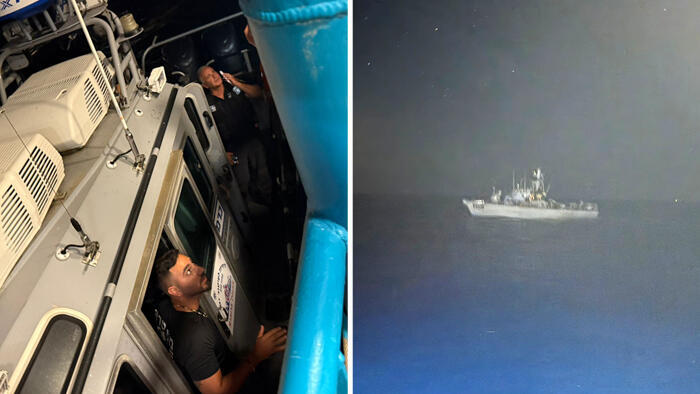
Startup Nation grounded: Inside the race home for Israel’s high-tech leaders stranded abroad
As Israel shuttered its skies in the wake of Operation Rising Lion, tech professionals have found themselves grounded in foreign cities, racing to return home through extraordinary means or holding the fort from afar.
With wartime precautions in place, members of Startup Nation’s tech sector have found themselves scattered across the globe.
Speaking to CTech, Israeli tech professionals shared firsthand accounts of being stranded abroad: some still in limbo, others resorting to extraordinary means by land, air and sea to return home.
5 View gallery


Alon Yariv, Oded Melamed, Dvorit Shahaf, Shahar Tal
(Photo: Mayko Studio, Rami Zarnegar, Rami Zarnegar, Shahar Tal)
Executives and founders scattered as flights grind to a halt
Travel plans were upended as Israeli airspace closed without warning. Some of the country’s tech professionals were minutes from landing when their flights were abruptly diverted.
Talor Sax, Managing Partner at eHealth Ventures (a VC fund that invests in Israeli health tech startups) had been on a private vacation in Canada celebrating his son’s army release when the conflict began. With flights to Israel suspended, he rerouted to Amsterdam where his fund and a delegation of portfolio companies had planned to attend the HLTH 2025 conference.
“My partner was supposed to be here, but he couldn't get out of Israel,” Sax told CTech. “So I came over, and I'm here running between meetings because I'm representing nine of our portfolio companies that couldn't make it.”
5 View gallery


Ronen Solomon, Alex Frenkel, Talor Sax
(Photo: altshare, Omer Hacohen, Jacob Mehager)
Dvorit Shahaf, CMO of Bridgewise, an AI-powered investment analytics platform, was in Bangkok preparing for a service launch. She’s now working remotely from a friend’s swimwear factory, while parenting her three children from afar.
“I have kids at home, and I have a big team to take care of. So it's really, really challenging. And I don't know when I'm going to get out of here,” she said.
In Italy, Alon Yariv, founder of AI infrastructure company Atero, was on a rare weekend getaway with his girlfriend when Israel’s skies shut down. Also in the country was Oded Melamed, CEO and co-founder of Quantum Source, a startup developing photonic quantum computing technology, who had been traveling with his family.
“From the moment I understood that there are no flights, I realized that we need to find a solution for ourselves,” said Melamed.
Others came close to making it home before being forced to change course. Alex Frenkel, CEO of AI mental wellness app Kai.ai, was returning from a family holiday on a flight from Berlin to Tel Aviv that had already begun its descent when it was diverted to Larnaca, Cyprus.
“The plane was already beginning to land,” he said. “Probably seven EL AL airplanes landed with us… It took me a couple of days to understand that we're not going to come back to Israel."
Now back in Israel, Shahar Tal, CEO of cybersecurity startup Cyata, was returning from two U.S. conferences when his El Al flight was likewise forced to divert to Larnaca just 20 minutes before its scheduled landing.
“The pilot said this is force majeure, so you're going to take care of your own hotels,” Tal recalled. “It was quite a mess, because no one knew what was happening."
Tech leaders chart workarounds in effort to return
While most Israeli tech professionals abroad remain grounded by widespread flight suspensions, a few have charted their own ways, going to exceptional lengths to return home.
Quantum Source’s Melamed followed a multi-leg journey through Egypt after hearing about a workaround taken by someone from Channel 12. He booked a flight from Rome to Sharm El Sheikh, drove to the Taba border crossing, and made his way into Eilat.
“It was not easy… I think it was the first time they saw people traveling with Israeli passports from Rome to Sharm El Sheikh,” said Melamed. “It was like 30 minutes of real tension, while the people at the check-in desk didn’t want to check us into the flight… but eventually we found someone that was able to read the actual regulation."
An Israeli tour operator on the Egyptian side helped arrange transportation and border logistics. And yet, despite the stress of the trip, there were brief moments of respite, if only stirred by flashes of nostalgia. “When I was traveling from Sharm El Sheikh to Taba, it felt like the old days, maybe 20 or 25 years ago, when we used to go to the Sinai and dive there,” he said. “I really hope that one day it will be possible again."
5 View gallery


Quantum Source’s Oded Melamed followed a multi-leg journey through Egypt
(Credit: Oded Melamed )
Elsewhere, after weighing options ranging from a US$4,000 private jet to a rented motorboat, Cyata’s Tal decided on a €700 spot aboard a medium-sized yacht, arranged through a figure known as “Uzi”, whom he found via an ad.
“He’s a carpenter by trade, but he found his way to become like the Minister of Transportation alternatives for the State of Israel,” Tal quipped.
The plan was quick to fray. The boat’s departure was delayed for hours, and conditions quickly deteriorated, eventually leaving passengers without clean water. “There was no more flushing of the toilets, no more drinking water… we were preparing for a 20-hour ride and it was already around 30,” he said.
Tensions peaked when the Israeli navy intercepted the boat and discovered that the crew had failed to obtain proper entry clearance. “People were shouting at the skipper, shouting at the police force… everything was, you know, an Israeli mess.” According to Tal, a resourceful former naval officer among the passengers ultimately helped resolve the standoff and repatriate the group.
“There were good intentions, but very poor execution, logistics, operations, or anything else,” he reflected. “Most of the people in the group want to sue.”
5 View gallery


Cyata’s Shahar Tal decided on a €700 spot aboard a medium-sized yacht from Larnaca
(Credit: Shahar Tal)
Israeli fintech company Altshare’s CEO, Ronen Solomon, shared what he called his personal “Exodus from Egypt” in a Facebook post. Caught mid-air en route from New York to Israel when the strike on Iran began, his plane turned back. “At that moment, I understood I am going to Israel,” he wrote. “There hasn't been a war I wasn’t in Israel for."
From New York, he rerouted via Athens, where spent two anxious nights, then flew to Cairo. After hours in the airport (including being questioned, assigned a guard, and asked for a bribe) he boarded a delayed flight to Aqaba, where he was again detained. From there, he took a taxi to the Jordan-Israel border and crossed by bus.
“The hug I got from Daniel was worth it all,” Solomon shared, referring to his teenage son. “The only nation where, during war, hundreds of thousands fight to return to their country. Am Yisrael Chai."
Meanwhile, others remain abroad and in flux.
“I signed up to multiple locations in order to fly back to Israel,” said Yariv of Atero. “Our account executive from El Al… I’m banging on his door to find the earliest available flight.”
And while those like Melamed, Tal, and Solomon made their way home through sheer grit and resourcefulness, a few eyebrows have been raised over how certain industry figures managed to return more swiftly than others. As Israeli journalist Josh Breiner noted on X, a handful of senior figures received more personal and expedited treatment in the early days of the war. Among them were veteran venture capitalist Pinchas Buchris (former commander of Unit 8200) and Yodfat Harel Buchris, Managing Director at Blumberg Capital, who returned to Israel on a military rescue flight from Athens aboard an Israeli Air Force Hercules.
“There was a military plane and I got on it. I don’t know how it worked out,” Buchris told Breiner, per Breiner’s post on X. “There were a lot of Israelis stranded in Athens who were told to come, and I joined the group. I was among the last to arrive. I didn’t speak to anyone or any senior official in any office. No one even knew I was in Athens, and I don’t think I leveraged my military background in any way.”
When asked how he knew about the flight, Buchris responded: “I didn’t ask for any special treatment. I received a lot of messages from Israel to come to the army’s rescue flight, and I made my way to Athens.”
Business continuity efforts stretch across borders
Even with key players marooned, Israel’s tech ecosystem has refused to slow down, with operational efforts being coordinated across borders to maintain business momentum.
In Amsterdam, Sax continues to represent eHealth Ventures at the HLTH Europe 2025 conference, where his fund and a delegation of nine portfolio companies had long planned to exhibit. “Like myself, there are others that were stuck overseas and came over to save the situation for their organizations... there are a few of us who could be here, and we have local help from local volunteers,” Sax said.
What stood out most from the experience, he said, was the solidarity. “The spirit that we see here from all Israelis that are here, helping each other, stepping in for each other, and even if we don't know each other from previous events... the brotherhood is here, and it's heartwarming.”
Meanwhile, his partner, Ophir Shahaf, has taken over his meetings back in Israel. “We adjust,” Sax added.
Kai.ai’s Frenkel also made his way to Amsterdam, rerouting through Vienna after initially landing in Cyprus. With many Israeli delegates unable to attend, his team leaned on the local Jewish community for support in setting up as a vendor at HLTH 2025.
“All my stuff was in Israel, but our amazing team found a ticket from Larnaca to Vienna, from Vienna to Amsterdam. We got help in setting up our booth here,” he said.
5 View gallery


L to R: Talor Sax (eHealth), Prof. Emeritus Yehuda (NimBio), Roel Schoondermark (eHealth) and Alex Frenkel (Kai.ai) at HLTH Europe 2025
(Credit: eHealth Ventures, N/A)
In Bangkok, Bridgewise CMO Dvorit Shahaf has been managing remote operations across multiple time zones, leveraging the coordination of a global team.
“I feel at this time that our employees around the world are really supportive… People are traveling [for example] from the Middle East to Cyprus to support an event,” she said. “So I think we really feel the advantage of being a global company.”
For Quantum Source, the pace has slowed due to the lab-based nature of its work. “The fact that we cannot work in the lab makes our life very, very difficult,” said Melamed. “We are making progress, although not as fast as regular days.”
“Some of the team members come for a couple of minutes every day, start on an experiment and check it remotely.”
In Italy, Yariv has focused on supporting his young team, many of whom have been called up to reserve duty. And while a planned headquarters move has been postponed following damage caused by missile strikes, business continuity remains strong.
“Our customers and the companies we work with, they have not voiced the concern that our capacity will diminish,” he said.
“One thing that was very important to me early on was explaining to our business partners that are not used to these types of situations and are not so familiar with how Israelis are, is that the situation might be bad, but we are going to deliver. It's not going to hurt our capacity in the slightest. Maybe even the opposite.”
Beyond business, the pressing personal need to return to Israel
While much of Startup Nation can operate remotely, the urgency to return goes beyond business. It’s about being home when it matters most.
“I still see no direction, no clue. I couldn't get any connection with El Al at all... I expect I will be here for another week, at least,” said Sax. “I really can't wait to go home. I'm off for three weeks already, and I have two daughters waiting.”
“We are a VC fund, a total team of eight people, and to be away and disconnected for so long is hard on everyone,” he added.
For Shahaf, managing global operations while coping with the emotional strain of being far from her family is taking its toll. “It feels very, very hard to be away from my family and also for my team,” she said.
“I’m doing multiple shifts in the morning in the time zone of Asia, and then I’m in the time zone of Israel, and then the U.S. wakes up. So it’s 24/7.”
As for most, the uncertainty has been the hardest part. “I think the most frustrating thing is that we don't know where it's going,” she said.
“Every day I'm asking myself if I should start on some [alternative] way back to Israel... but at the same time [El Al] is saying soon we are going to open Bangkok. So I'm kind of in between.”
Even for those accustomed to remote work, like Frenkel, the distance is hard to bear. “I have two teenage daughters. We live in Haifa, so obviously the nights are super stressful,” he said.
The same held true for Tal. “I really wanted to be here for my family,” he said. “Getting texts, talking to my children... They wanted me to be here. My son’s hugging me right now as I’m saying this.”
Despite the destruction hitting close to home, with a blast near his office shattering the building’s lobby, Tal remains cautiously optimistic. “All of us understand that… something great is happening, and we are winning the war… Overall, we're in a better place than we were last week.”
At the same time, Yariv expressed a conflict many Israelis abroad are carrying with them: “There is a certain level of guilt, I would say, being abroad while my country is getting missile attacks and my employees are under fire. So, as a leader, I want to be as close as I can to them.”
As for Oded Melamed, the decision to return by any means necessary was a given, even if the path wasn’t. “My daughter and my wife are with me, and my two oldest sons are in military service… I could stay there, but the feeling that there is a war going on and I’m in Rome didn’t make me feel good,” he said.
“There’s no reason. I just feel I need to be home."
The defense decision behind Israel’s airspace closure and why it matters
Israel’s large-scale military strike in Iran led to the immediate closure of the country’s airspace, coinciding with the opening of hostilities last Thursday. As Ben Gurion Airport was completely evacuated and airlines canceled all flights, between 100,000 to 150,000 Israeli citizens around the world suddenly found themselves unable to return home.
Among the tens of thousands of Israelis currently stuck abroad – unable to reenter the country in the coming days – are a considerable number of high-tech professionals, entrepreneurs, executives, and investors. Many of them have resorted to creative workarounds in an effort to bypass the rigid restrictions and return to Israel despite the shutdown. The only official crossings that remain open are the land terminals on the borders with Egypt and Jordan. In addition, there is limited possibility of entering Israel by sea – via private, small yachts from nearby Mediterranean countries such as Cyprus and Greece.
A number of Israeli tech workers, embodying the resourcefulness associated with the country’s startup culture, have employed inventive strategies to break through the de facto blockade imposed by the war.
The government’s decision followed a comprehensive security assessment and was based on both security and organizational considerations. Its primary goal was to safeguard the public and enhance the operational efficiency of the country’s emergency and defense systems. The main factor behind the closure was the direct threat posed by Iran, which has launched missiles and UAVs toward Israeli territory. The shutdown of the airspace and restriction of air traffic were intended to reduce the risk to civilian aircraft and passengers, while allowing the Israel Defense Forces and the broader security establishment maximum freedom to operate and neutralize aerial threats.
Moreover, in wartime, the security system requires a high degree of operational flexibility. Closing the borders enables authorities to concentrate efforts on responding to immediate threats, while reducing the strain on critical civilian infrastructure such as airports, border crossings, and public transportation systems. In order to minimize unnecessary risk and support the efforts of security forces, the Home Front Command has advised the public to avoid nonessential travel. Limiting civilian movement allows for more effective evacuations, rescues, and emergency responses during attacks, while also granting the state better control over the civilian sphere.
Another major concern lies in the risk posed by large concentrations of passengers inside airport terminals before takeoff and after landing. Crowds of hundreds or even thousands gathered in enclosed, glass-heavy waiting areas – such as airport terminals – could become highly vulnerable targets in the event of a missile strike or incursion by a hostile aircraft.
During uncertainty or mass flight cancellations, passengers tend to arrive at airports earlier than usual, hoping to secure a spot on an alternative flight. This behavior causes significant congestion in check-in and security areas, which are not designed to function as fortified shelters. Even after landing, passengers may find themselves stranded at the airport due to restricted ground movement, suspended public transportation, or tightened security at entrances and exits. The result is a potential “human traffic jam” at a time when the state is trying to limit movement and prevent prolonged presence of civilians in unprotected areas.













